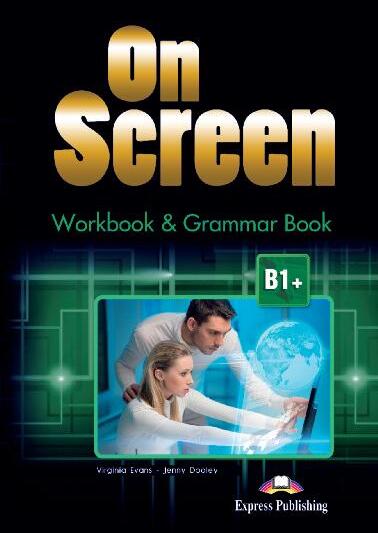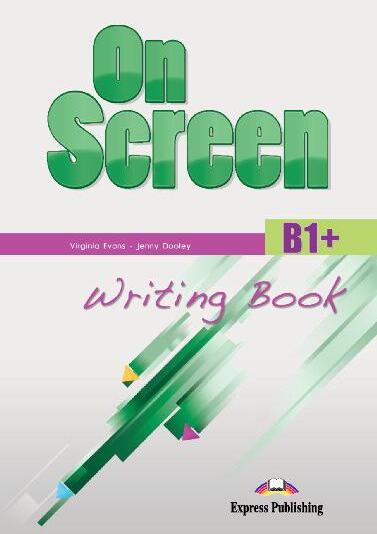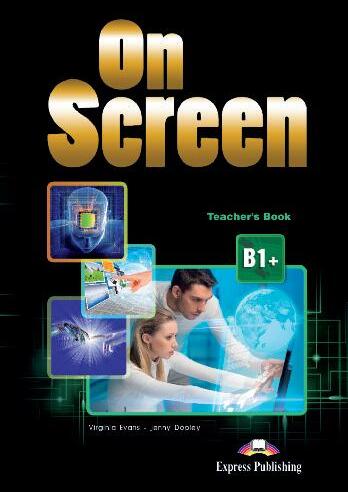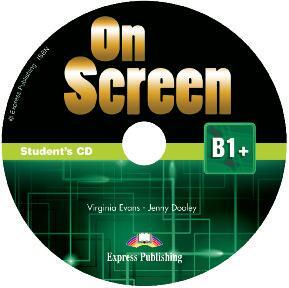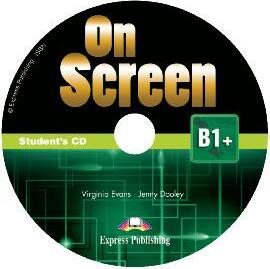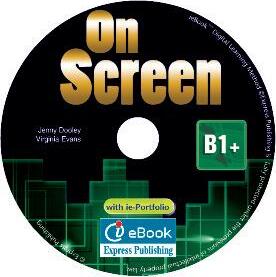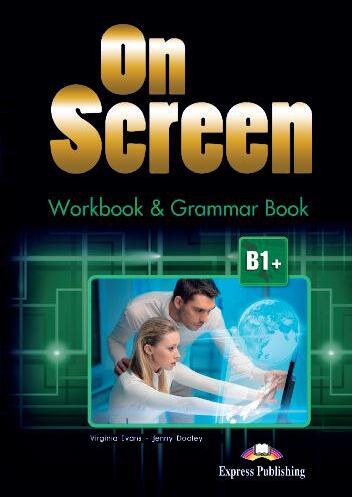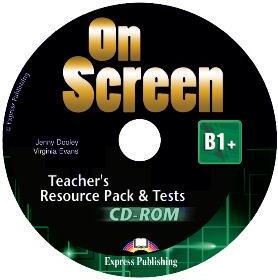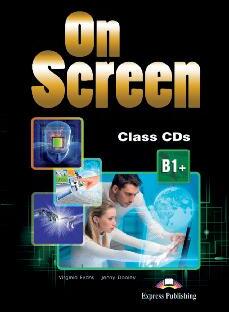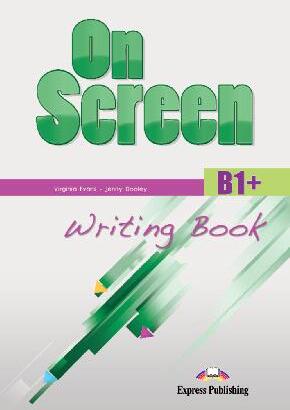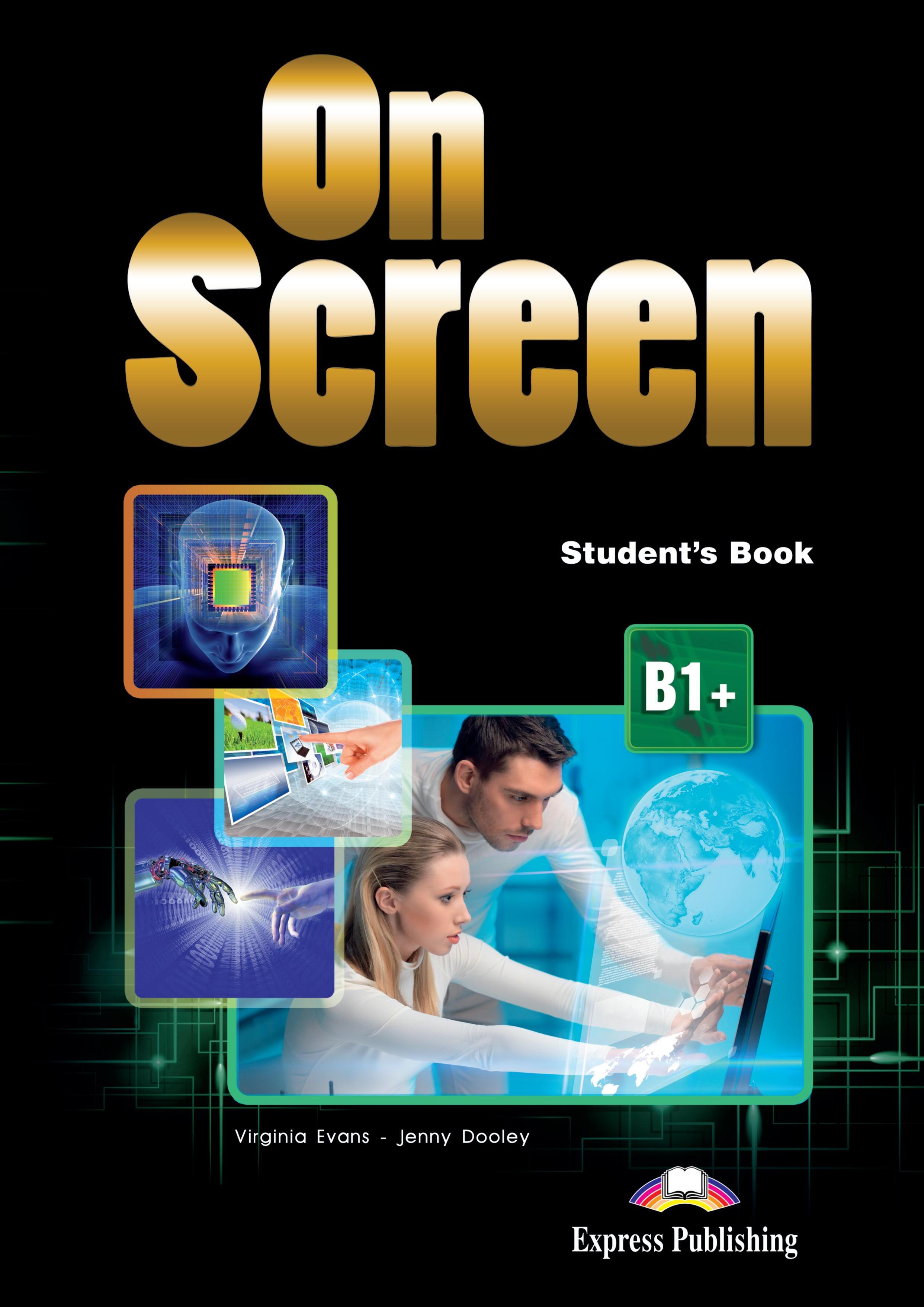

Living together

M O D U L E O B J E C T I V E S
▶ Vocabulary
• people around the world
• stages of life
• physical characteristics
• character
• families
• phrasal verbs: B R E A K
• word formation: -ing/-ed participles
• prepositions
▶ Reading an article about the Hadza (multiple choice, answer questions)
▶ Grammar
• present tenses
• time adverbs
• comparative & superlative
• exclamations
• plurals
▶ Listening a radio interview (multiple choice, note taking)
▶ Speaking
• asking for & expressing opinion/(dis)agreement
• comparing pictures
▶ Writing
• a paragraph comparing people
• an opinion essay
▶ Language Focus
• words often confused
• grammar in focus
• sentence transformations;
• cloze text

Words of wisdom
“The happiest people don’t have the best of everything; they just make the best of everything.”
People around the world

I’m Odval and I’m from Mongolia, a country between Russia and China I often wear a scarf over my 1) hair and I have 2) cheeks from the cold Mongolia is very cold, but Mongolians are warm, 3) people We are always 4) to have guests Why don’t you visit us in Mongolia?
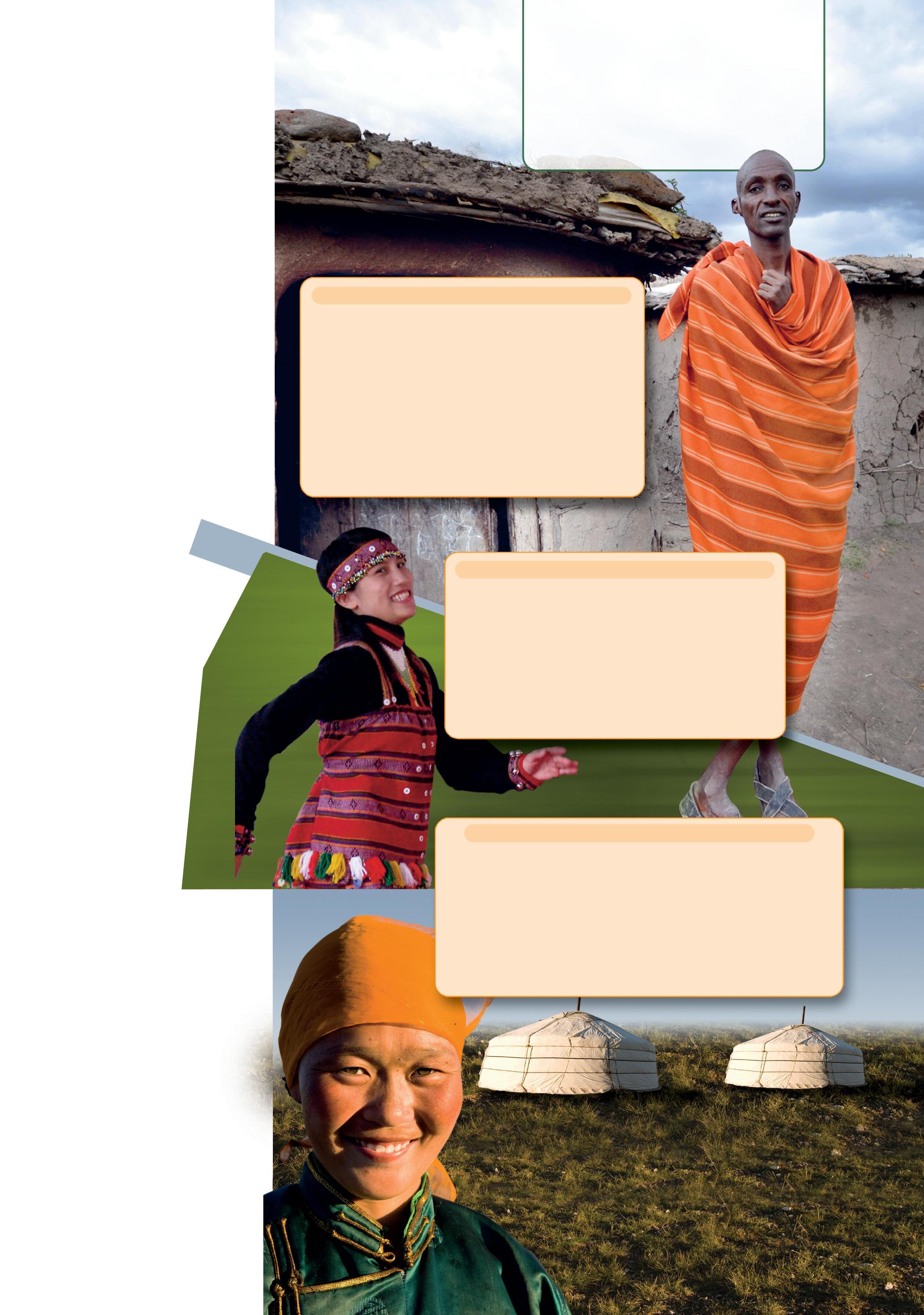
I’m Koyati and I’m from the Maasai, a 5) tribe in Eastern Africa
Our clothes are very 6) ............................... and we like to wear bracelets and necklaces. As a people we are tall and 7) ............................ . We are also hardworking and 8) .................... .
▶ Progress Check M o d u l e 1


Hi, my name’s Pui-Litan. My people, the Atayal, live in villages in the mountains of Northern Taiwan Our name means ‘True People’. We have 9) .......................... skin. Our men are great hunters and our women are excellent weavers. In the old days, the Atayal people wore 10) ...................... tattoos. We are brave and 11) .................... people. We are also 12) .................... and don’t like fighting.

Listen and match the descriptions (A-C) to the pictures (1-3).

a) Find the words in the texts that describe: appearance; character. b) Use these words to describe the people in the photos.

Reading

a) Check these words in the Word List at the back of the book. Use them to fill in the sentences.
• b o w s • l e a n • c u r l y • a t t a c h e d
• n a t i v e • g a t h e r • c r o p s
• g e n e r o u s • w a n d e r
1 T h e H a d z a p e o p l e a r e n ’ t p l u m p ;
t h e y a r e
2 T h e y h a v e . . . . . . . . . . . . . . . . . . . . . b l a c k h a i r .
3 T h e H a d z a t h e
v a l l e y h u n t i n g w i t h . . . . . . . . . . . . . . . . . . . . . . . . .
a n d a r r o w s .
4 T h e y d o n ’ t g r o w f o r f o o d
5 H a d z a n e i s t h e i r
l a n g u a g e
6 T h e y a r e p e o p l e
a n d s h a r e e v e r y t h i n g
7 T h e y a r o u n d t h e
f i r e t o e a t
8 T h e y d o n ’ t b e c o m e
t o p e o p l e a n d t h i n g s
b) What do the sentences in Ex. 1a tell us about the Hadza?
c) Why are they the last of the first? Read through to find out.

Multiple choice
Read the text quickly to get the general idea and the writer’s purpose Read the questions and underline the key words. Read the text carefully to answer the questions Note that the first question focuses on writer purpose and the last on overall meaning. The other three follow the order of information in the text and one of them focuses on attitude or opinion

C

2

Read the text. For each question, choose the correct answer A, B, C or D
1 W h a t i s t h e w r i t e r d o
B promoting the hunter-gatherer lifestyle
C h e l p i n g p r o t e c t t h e H a d z a t r i b e
D r e c o m m e n d i n g a h o l i d a y e x p e r i e n c e
2 W h a t d o e s t h e w r i t e r s a y a b o u t h i m s e l f ?
A H e i s n ’ t e n j o y i n g h i s v i s i t
B H e i s h a p p y t o l e a r n H a d z a n e
C H e i s d i s a p p o i n t e d w h e n n o b o d y
s a y s g o o d b y e
D H e i s e x c i t e d a b o u t m e e t i n g t h e m
t h e l a s t o f t h e f i r s t
They don’t grow crops, they don’t raise animals and they don’t count
the days or months – the Hadza tribe of East Africa is probably the last hunter-gatherer tribe on Earth.
The tribesmen are sitting by the fire They are feeling hungry A camp elder, Onwas, tells the others of a tree he saw filled with baboons. They all pick up their bows and set off to go hunting. Onwas is around 60 years old and quite short at 1.5 metres, but he is lean and fit The rest of the men are also slim with short curly black hair Their hunting knives hang from animal skin belts Onwas invites me on the hunt in his native language, Hadzane. I have come to the Hadza homeland of Tanzania for a few days with an interpreter: Onwas’ niece I am thrilled to get close to the Hadza people They live in the extreme heat of the Yaeda Valley where the soil is poor, water is in short supply and the bugs are terrible They don’t keep track of time: hours, weeks, months and years have no meaning to them They have no crops, no animals and no houses. They live completely off what nature provides. That’s why I am here I have come to meet these hunter-gatherers in person
3 What does the reader learn about the Hadza from the text?
A T h e y a r e c o n c e r n e d a b o u t t i m e
B T h e y m o v e f r o m p l a c e t o p l a c e
C T h e y w o r r y a b o u t t h e i r f o o d .
D T h e y h a v e a f i x e d d a i l y r o u t i n e
4 H o w d o e s t h e w r i t e r d e s c r i b e t h e H a d z a i n p a r a g r a p h D ?
A T h e y a r e r e s p o n s i b l e
B T h e y a r e w o r r i e d a b o u t t h e i r f u t u r e
C T h e y r e s p e c t n a t u r e
D T h e y d o n ’ t g e t u p s e t e a s i l y
5 W h a t m i g h t t h e w r i t e r s a y a b o u t t h e H a d z a ?
A T h e y s e e m h a p p y w i t h t h e w a y t h e y l i v e
B T h e i r w a y o f l i f e i s n o t g o o d f o r t h e m a n d t h e y n e e d o u r h e l p
C T h e i r l i f e s t y l e i s b e t t e r t h a n t h e w a y w e l i v e t o d a y
D T h e y s h o u l d h a v e t h e i r o w n l a n d a n d l e a r n t o f a r m
D
After a successful night hunting baboons, we return to the camp The women have gathered berries and fruit The tribe shares everything They are generous and easy-going people with lots of free time. They come and go from the camp as they please and sleep whenever they want When it’s time to eat, we gather around the fire Once the meat is ready, everyone just dives in Nobody knows when the next meal is as the Hadza don’t plan for the future They wander the land taking food from it whenever they need, carrying their few possessions with them
E
Free from belongings, jobs, money and responsibilities, I can’t help thinking, as I prepare to leave, that perhaps the Hadza are better off this way They don’t seem to have any worries Hadza do not become attached to people or things, so my arrival and now my departure have had little effect on them Smiling and walking away, I wonder about their future: is it only a matter of time before the days of wandering the valley are over for the Hadza? I hope not
Check these words
• elder • filled with • baboon • pick up • bow • set off
• lean • fit • curly • hang • skin belt • hunt
• native language • homeland • interpreter • niece • extreme
• heat • soil • poor • short supply • bug • keep track of time
• meaning • live off • nature • provide • hunter-gatherer
• in person • gather • berry • generous • easy-going • dive in
• possession • free from belongings • responsibilities
• be better off • worry • attached to • arrival • departure
• effect • wonder • matter of time • be over


I C T
Listening & Speaking
Listen and read the text. Say four things you have learnt about the Hadza from the text. What else would you like to know about the Hadza? Collect information about their religion, celebrations, houses and family life. Present it to the class.

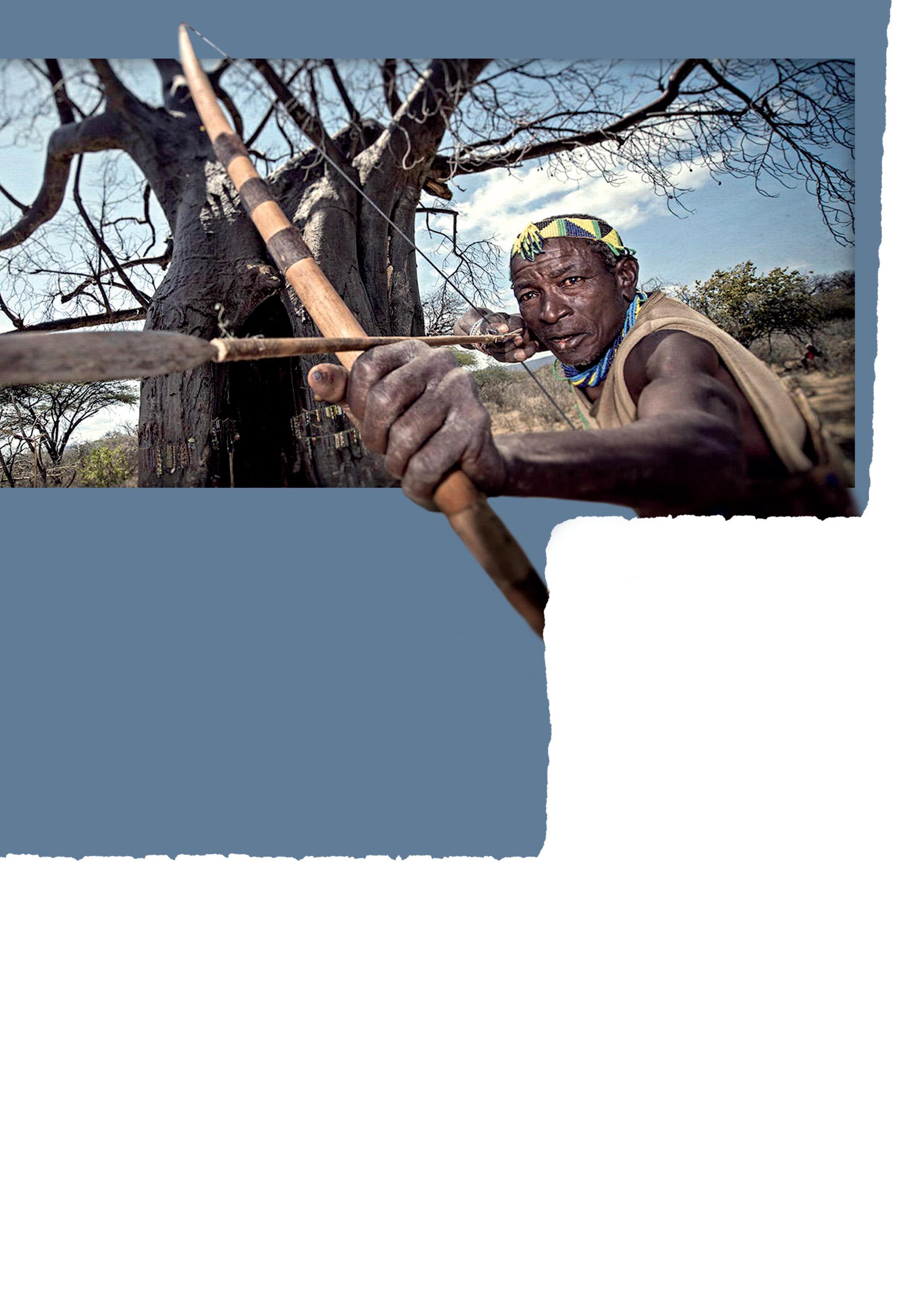
3

Read the text again and answer the questions.
1
2 Why do you think they don’t become attached to people or things?
3 Why is the writer worried about their future?

4
a) Match the words in bold to their synonyms:
5

b) What part of speech is each word: noun? verb? adjective? adverb?
a) Describe the picture in the text.
b) Compare the Hadza people to the people in your country. SPEAKING
Writing
Imagine you are staying with the Hadza tribe for a week. In three minutes write a few sentences describing your experience. Tell your partner or the class.

Vocabulary 1b
Vocabulary from the text

Choose the correct word.
1 The village elder/native plans the day’s hunt.
2 He wants to get thrilled/ close to the tribe.
3 Some people find it difficult to keep/hang track of time.
4 He likes providing/sharing things with his friends.
5 It seems that time has no supply/meaning to Onwas.
6 Other tribes raise sheep and grow crops/animals
7 They never plan/invite for the future.
8 I want to see the tribe in person/people
9 The man gathers/picks up his bow and sets off to hunt.
10 The children don’t go to school and do as they please/feel


Choose the correct preposition.
1 The streets are filled of/with people.
2 Coffee is in/at short supply as demand rises.
3 In the evenings they often sit in/by the fire.
4 They always carry their bows on/with them.
5 We need to keep children free of/from violence.
6 The news has little effect on/ for Kate.
Topic vocabulary

a) Look at the stages of life. Which one are you in?

adulthood (19 yrsold age) adolescence (12-18 yrs old) childhood (1-11 yrs old) infancy
b) In pairs match the activities to the stages of life above.
•start a family •crawl •retire •go to school •graduate •learn to read and write •get a part-time job •get married •get a promotion •get a job
A person normally starts a family in adulthood.
Physical characteristics

Complete the table. Use:
•hair •lips •age •build •eyes •face •height •nose •complexion














child, young man or woman, middle-aged, old, in his/her late/early twenties tanned, dark, pale tall, short, of average height skinny, plump, overweight, thin, slim, athletic, well-built oval, round, long full, thin brown, big, small, hazel big, flat, hooked curly, short, straight, long, wavy, bald, frizzy, fair, dark, shoulder-length wrinkles, freckles, glasses, beard, moustache
Use words from Ex.5 to describe the people in the pictures.









Choose a person in the class and describe him/ her to your partner. Your partner guesses who the person is.
... is tall and slim with short curly hair, blue eyes and thin lips.
Character

Choose the correct adjective. Check in the Word List at the back of the book.
1 T o m b e h a v e s p r o p e r l y a n d s e n s i b l y
e a s y - g o i n g / arrogant/ r e s p o n s i b l e
2 P a u l d o e s n ’ t k e e p t h i n g s c l e a n a n d
o r g a n i s e d f o r g e t f u l / a n n o y i n g / m e s s y
3 J a n e f e e l s u n c o m f o r t a b l e w i t h o t h e r p e o p l e .
a m b i t i o u s / s e n s i t i v e / s h y
4 Pam never lies t r u t h f u l / o p e n - m i n d e d / b o l d
5 Ann uses her common sense to solve problems g r u m p y / s e n s i b l e / s e l f - c o n f i d e n t
6 J o h n l i k e s b e i n g w i t h p e o p l e i m p a t i e n t /
g e n e r o u s / s o c i a b l e
7 B o b a l w a y s e m b a r r a s s e s p e o p l e w i t h w h a t
h e s a y s c a r e f r e e / r u d e / b r a v e
8 M a r y t h i n k s s h e i s t h e b e s t a r r o g a n t / f r a n k /
h o n e s t
9 Pat takes pride in her looks. bossy/vain/stingy
1 0 M a r k h a s v e r y g o o d m a n n e r s m e a n / p o l i t e /
o u t g o i n g
1 1 J o h n e n j o y s t e l l i n g p e o p l e w h a t t o d o
h e l p f u l / b o s s y / n o s e y
1 2 Peter is always nervous or worried

9
a n x i o u s / n o i s y / s a d
Match the adjectives to their opposites. Which adjectives best describe you?
q u i e t
p o l i t e
s e l f - c o n f i d e n t 1 3
g e n e r o u s
h a r d w o r k i n g
h o n e s t


Families

a) Form pairs. 11 mum aunt sister daughter grandma niece mother-in-law father-in-law brother dad uncle son grandpa nephew

13

b d i s h o n e s t
c i n s e c u r e
d l a z y
e s t i n g y
f r u d e
I ’ m q u i e t a n d p o l i t e I c a n b e l a z y a t t i m e s
10 SPEAKING
Listen to two people talking about their friends. Match the people to the character adjectives. Two adjectives do not match
P e o p l e
P e t e r
S a m
L i l y
P a u l
M a r k 0 g 1 2 3 4 5
E m m a
C h a r a c t e r
a o u t g o i n g
b a n x i o u s
c r u d e
d p o l i t e
e r e s p o n s i b l e
f m e s s y
g s h y
h b o s s y a n o i s y

14


b) What do your family members look like? What are they like? Tell the class.
c) What is a nuclear family? an extended family? a single-parent family?
Phrasal verbs: BREAK
Choose the correct particle. Check in Appendix I.
1 T h e y b r o k e u p / i n t o l a s t w e e k ( s e p a r a t e d )
2 Mike’s car often breaks off/down (stops working)
3 Arguments often break out/off between them (begin suddenly)
4 H e l e n b r o k e d o w n / o u t w h e n s h e h e a r d t h e
n e w s ( s t a r t e d c r y i n g )
Word formation (-ing/-ed participles)
Read the theory, then choose the correct adjectives.
• We use -ing adjectives to describe what sb/sth is like He’s an interesting person (What is he like?)
• We use -ed adjectives to describe feelings He feels frightened. (How does he feel?)
1 A m y g e t s e a s i l y a n n o y e d / a n n o y i n g
2 He’s confused/confusing about her behaviour
3 S h e ’ s a n a m u s e d / a m u s i n g p e r s o n .
4 Sue is very i n t e r e s t i n g / i n t e r e s t e d in Maths
5 T h e n e w s i s s h o c k i n g / s h o c k e d !
6 H e ’ s s u c h a b o r i n g / b o r e d p e r s o n
Prepositions
Choose the correct item. Check in Appendix II.
1 Y o u c a n a l w a y s c o u n t t o / o n m e
2 S a m d i s a g r e e s t o / w
John hardly ever pays attention at/to what I say.

Grammar in use 1c
Present simple/Present continuous/Present perfect/Present perfect continuous

1


To: Katie
From: Laura
Subject: News!
Hi Katie,
Thanks for your email. Sorry I haven’t written back sooner but 1) I’m having a toug time. My cousin, Jane, 2) has just moved into my flat. She’s really annoying becaus 3) she’s always borrowing my things without asking. Today 4) I’ve been cleaning m room all morning and half my things are missing!
Anyway, what are your plans for the weekend? I usually 5) go to the cinema on Saturdays with my flatmate Sue. This Saturday 6) we’re seeing the new Bond movie I love Bond movies – 7) I’ve seen all of them! Why don’t you come with us? I can ge cheap tickets from a friend of mine who 8) works there. It 9) starts at 7 o’clock at Th Roxy in the town centre. Well, I’ve got to go now. Sue 10) is calling me for dinner. Let me know if you’re coming, Laura
a) Read the email Is it formal or informal? Give reasons
b) Identify the verb forms (1-10) in bold Match them to the uses (A-J).
a h a b i t / r o u t i n e
a p e r m a n e n t s t a t e
a t i m e t a b l e
a f i x e d f u t u r e
a r r a n g e m e n t
a t e m p o r a r y s i t u a t i o n
a r e c e n t l y c o m p l e t e d
a c

2
t h e p r e s e n t
an action that happened at an unstated time in the past
Choose the correct tenses. Justify your choices.
1 A: Chloe is graduating/has graduated next month
B: I know I have just received/have just been receiving an invitation for the ceremony.
2 A: H a v e y o u b e e n s e e i n g / H a v e y o u s e e n Dan anywhere?
B : N o , I ’ v e b e e n l o o k i n g / ’ v e l o o k e d f o r h i m m y s e l f f o r t h e l a s t h o u r
3 A : D o e s S a l l y l i v e / I s S a l l y l i v i n g i n t h e t o w n c e n t r e ?
B : Y e s , b u t s h e l o o k s / i s l o o k i n g f o r a n e w p l a c e a t t h e m o m e n t
4 A : H u r r y u p ! T h e b u s l e a v e s / i s l e a v i n g i n a n h o u r
B : Y o u h a v e a l w a y s r u s h e d / a r e a l w a y s r u s h i n g m e !
5 A : W h a t h a s A m y d o n e / i s A m y d o i n g t h i s m o r n i n g ?
B : S h e u s u a l l y w a l k s / i s w a l k i n g t h e d o g i n t h e p a r k , b u t t h i s m o r n i n g s h e g o e s / i s g o i n g s h o p p i n g
6 A : W h a t t i m e a r e y o u m e e t i n g / h a v e y o u m e t A l e x ?
B : W e a r e a l w a y s m e e t i n g / a l w a y s m e e t a t 6 : 3 0 o n
W e d n e s d a y s

3

Put the verbs in brackets into the present simple or the present continuous. Give reasons for your answers.
1 a M o s t p e o p l e
( e n j o y ) g o i n g t o t h e
c i n e m a .
b I
( e n j o y ) t h i s b o o k I t ’ s
r e a l l y g o o d !
2 a G a r y
( a p p e a r ) i n a p l a y t h i s
w e e k e n d
b H e
( a p p e a r ) t o b e f e e l i n g
b e t t e r t o d a y
3 a Y e s , I
( s e e ) w h a t y o u m e a n
b L e o
( s e e ) P e t e r t o m o r r o w
m o r n i n g .
4 a S a l l y
( t h i n k ) o f g o i n g t o R u s s i a .
b I . . . . . . . . . . . . . . . . . . . . . . . . . . . . . . . . . . . . . .
( n o t / t h i n k ) s h e ’ s t e l l i n g
t h e t r u t h
5 a This lasagna ....................
( t a s t e ) fantastic Try some!
b S h e
( t a s t e ) t h e s o u p t o s e e i f i t
n e e d s m o r e p e p p e r
4

What do you do over a typical weekend in your free time? What are you doing this weekend? Use phrases from the box to discuss with your partner.
a l w a y s
s o m e t i m e s
o f t e n
u s u a l l y
5

c l e a n r o o m , h o o v e r c a r p e t s
w a t c h T V , p l a y c o m p u t e r g a m e s , g o t o
f r i e n d s , e a t o u t
A : W h a t d o y o u u s u a l l y d o i n y o u r f r e e t i m e ?
B : W e l l , I u s u a l l y S o m e t i m e s , W h a t
a b o u t y o u ? e t c
Choose the correct adverb.
1 H a v e y o u m e t D a v i d y e t / e v e r ?
2 T o m ’ s s o f a r / n e v e r s e e n h i s c o u s i n s
3 M a r k ’ s s i n c e / j u s t f i n i s h e d e a t i n g d i n n e r
4 I ’ m w a t c h i n g T V s t i l l / r i g h t n o w
5 L u k e h a s e v e r / a l r e a d y p h o n e d L i a m
6 A n n ’ s b e e n i n D u b a i f o r / s i n c e t w o y e a r s



Underline the comparative forms and circle the superlative forms in the text below Ex 6 How do we: compare two people or things? compare more than two people or things? show that two things are the same or not the same?

8
Fill in the comparative or superlative forms. Include of, than or as.
1 A : T h a n k s f o r h e l p i n g w i t h t h e p r o j e c t .
B: It was ............................... (little) I could do.
2 A : D a r r e n i s b y f a r ................ ( i n t e l l i g e n t ) p e r s o n I k n o w .
B: That’s true. There’s no one ......................... ( g o o d ) him at Maths!
3 A : F r a n i s a b i t . . . . . . . . . . . . .
(patient) Sue
B: Yes, but Sue is much ( k i n d )
4 A : The ................................... (slow) we walk, the (late) we get there
B: I can’t walk much (fast) this!
5 A : Ann is ........................ (outgoing) Pat.
B : Y e s , b u t S t e l l a i s ( e a s y - g o i n g ) a l l
In pairs act out dialogues as in the example.
1 t i r e d – c l e a n r o o m / d u s t t h e f u r n i t u r e ( ✓ ) , h o o v e r t h e c a r p e t s ( ✓ ) , m a k e m y b e d ( ✗ )
A: You look tired What have you been doing?
B : I ’ v e b e e n c l e a n i n g m y r o o m
A : W h a t h a v e y o u d o n e s o f a r ?
B: I’ve dusted the furniture and hoovered the carpets, but I haven’t made my bed yet.
2 e x c i t e d – p r e p a r e f o r t h e e v e n t / o r d e r f o o d ( ✓ ) , s e n d t h e i n v i t a t i o n s ( ✓ ) , d e c o r a t e t h e
h o u s e ( ✗ )
3 e x h a u s t e d – d o m y c h o r e s / w a t e r flowers (✓), mop the floor (✓), walk the dog (✗) 6
Comparatives & Superlatives


Key word transformations
Use the words in bold to complete the second sentence, so that it means the same as the first. Use two to five words.

Peter is tall, but John is a bit taller than Peter. Steve is the tallest of all. Steve is more patient than Peter Peter isn’t as patient as Steve John is the least patient of all, but he is the most hardworking of all
s e e p p. G R 3 - G R 4

4 I ’ v e n e v e r b e e n t o C h i n a b e f o r e F I R S T
a t e
I t ’ s t h e t o C h i n a
5 She started learning Russian two months ago BEEN
S h e t w o m o n t h s
Use the following adjectives/adverbs to compare people in your family: noisy, outgoing, quickly, helpful, serious, slowly, generous, confident, lazy, impatient, polite Tell your partner

WRITING
Use your answers in Ex. 10 to write an email to your English-speaking friend about your family. 11

Multiple choice

1
1
2
1d Listening skills
Preparing for the task
Read the questions (1-2) below and then answer the questions a and b.
A
2
B
C
a
b

Read the dialogue and answer the questions in Ex. 1. Use the underlined phrases to help you.
Presenter: Thank you for giving up a busy morning at the hospital to come to the studio and talk to me, Doctor Lee
Dr Lee: It’s my pleasure. The hospital is just up the street, actually, so it’s easy to get here
Presenter: OK Now the first question sent in by Jane from Halifax is this: what value do you put on friendship for someone’s psychological wellbeing?
Dr Lee: I think it has a great deal of importance. You may have lots of friends but not all friends are good friends It is very important for everyone to have someone in their life who they can trust and who they know truly has their best interests at heart – someone who accepts them for who they are and likes everything about them – even their faults This is not easily achieved.

a) You will hear part of an interview with a girl called Lucy Baker who has written a book Before you listen, check these words/phrases in the Word List. What do you think the book is about?
• n u c l e a r f a m i l y • e x t e n d e d f
• cooperation • peace and quiet • complain • close relationships • hurt feelings


Read through the questions and underline the key words They contain information about the situation and what to listen for. Remember that you will hear the answers in the same order as the questions are
b) Listen to the interview. For questions 1-5, choose the correct answer A, B or C.
1 H o w d o e s L u c y d e s c r i b e h e r f a m i l y ?
A n o i s y B l a r g e C f u n n y
2 L u c y s a y s h e r g r a n d p a r e n t s
A g i v e h e r l o t s o f a d v i c e
B a r e v e r y o l d
C m a k e m i s t a k e s
3 W h a t d o e s L u c y l i k e a b o u t f a m i l y o c c a s i o n s ?
A d o i n g c h o r e s t o g e t h e r
B g e t t i n g t o g e t h e r
C h a v i n g l o t s t o d o
4 L u c y d o e s n ’ t l i k e t h e f a c t t h a t
A n o o n e e v e r l i s t e n s t o h e r
B t h e h o u s e i s n e v e r q u i e t .
C h e r f a m i l y t a l k s t o o m u c h
5 L u c y f o u n d i t d i f f i c u l t t o
A l i s t e n t o h e r f a m i l y ’ s c o m p l a i n t s . B g e t h e r f a m i l y t o r e a d t h e b o o k
C t e l l t h e t r u t h a b o u t h e r f a m i l y

4
What are the advantages of living in an extended family? What are the disadvantages?
Listen again and make notes Tell the class

5
6

Would you like to be part of an extended family? Why (not)? Tell your partner.
Intonation: Exclamations
a) Fill in How or What. 1 a n n o y i n g ! 2 a r u d e p e r s o n A n n i s !
How + adjective/adverb How noisy he is!
How quickly he walks!
What + (a/an) adjective + countable noun
What a nice family! What polite children!
What + adjective + uncountable noun
What bad weather!
f r i e n d l y p e o p l e !
f a s t h e t a l k s !
5 g r e a t n e w s !
b) Listen and check then repeat. Mind the intonation.
1

Speaking skills 1e
Asking for & Expressing opinion/(dis)agreement
Read the first and the last exchanges. What do you think the dialogue is about? Read through and check
A n n : R e m e m b e r L a u r a a n d P a u l ?
T h e y a r e h a v i n g a n e w b a b y
b o y
S a l l y : R e a l l y ? T h e i r d a u g h t e r m u s t
1 ) . . . . . . . . . . . . . . e x c i t e d .
A n n : A c t u a l l y s h e ’ s a b i t u p s e t
2 ) i t S h e l i k e s
3 ) a n o n l y c h i l d
b e c a u s e s h e g e t s 4 )
t h e a t t e n t i o n
S a l l y : E r r , i n m y o p i n i o n i t ’ s
5 ) t o h a v e s i b l i n g s
I t c a n b e l o n e l y 6 )
y o u ’ v e g o t n o o n e o f a s i m i l a r
a g e t o t a l k 7 ) o r
h a n g o u t w i t h
A n n : T h a t ’ s c o r r e c t O n t h e o t h e r
h a n d , w h e n y o u ’ r e a n o n l y
c h i l d , y o u n e v e r h a v e t o
s h a r e y o u r r o o m 8 ) . . . . . . . . . . . . . .
y o u r t h i n g s .
S a l l y : C e r t a i n l y , b u t t h e w a y I s e e i t ,
t h a t c o u l d 9 ) y o u
s p o i l t I f y o u d o n ’ t l e a r n t o
s h a r e , y o u c a n b e c o m e
s e l f i s h D o n ’ t y o u a g r e e ?
A n n : N o t r e a l l y I t h i n k t h a t b e i n g
a n o n l y c h i l d m a k e s y o u
i n d e p e n d e n t b e c a u s e y o u g e t
u s e d t o d o i n g t h i n g s b y 1 0 )
S a l l y : S t i l l , i t ’ s n i c e t o h a v e a
b r o t h e r o r s i s t e r t o s h a r e y o u r
s e c r e t s I s n ’ t t h a t r i g h t ?
A n n : T h a t ’ s t r u e A n y w a y , I ’ m s u r e
B e c k y w i l l l o v e h e r n e w
b r o t h e r .

Read again and complete the gaps with these words: when, feel, be, to, all, about, or, being, make, yourself, better, you. Two words are extra 2
3


a) Listen and check. Is it a formal or informal dialogue? Give reasons
b) Take roles and read the dialogue aloud. Mind the intonation.

4
Which underlined phrases in the dialogue ask for/express opinions and agree/disagree? Replace them with phrases from the Useful Language box.
Expressing opinion Asking for opinion
• I n m y o p i n i o n ,
• I f y o u a s k m e ,
• I ( d o
Expressing agreement
• I ( q u i t e ) a g r e e / T h a t ' s r i g h t
• That's correct /True
• O f c o u r s e /
C e r t a i n l y
• I c o u l d n ’ t a g r e e m o r e .

5
Expressing disagreement
• I d o n ' t a g r e e / T h a t ' s n o t r i g h t
• Y o u a r e w r o n g t h e r e
• N o t , s o / C e r t a i n l y n o t / I d o n ' t t h i n k
s o / T h a t i s n ' t t r u e
• O f c o u r s e n o t / C e r t a i n l y n o t
• N o , I d o n ' t t h i n k s o
Should grandparents look after their grandchildren? Use phrases from the language box and the ideas below to act out a dialogue similar to the one in Ex. 1.
l d r e n .
• May lack strength to take care of active children
• C a n o f f e r a d v i c e t o y o u n g e r g e n e r a t i o n .
Comparing pictures

6
• I b e l i e v e n o t . A
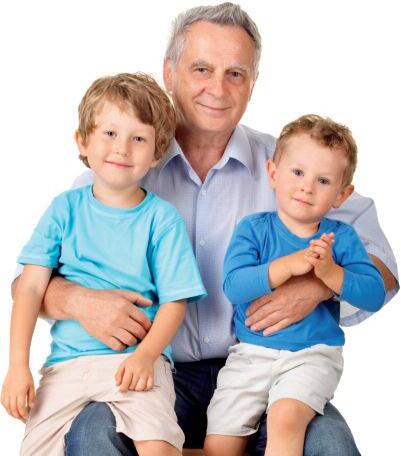
Compare the pictures. Use ideas from the dialogue in Ex 1 While speaking link your ideas Use: and, too, as well, whereas, but, on the other hand, etc.

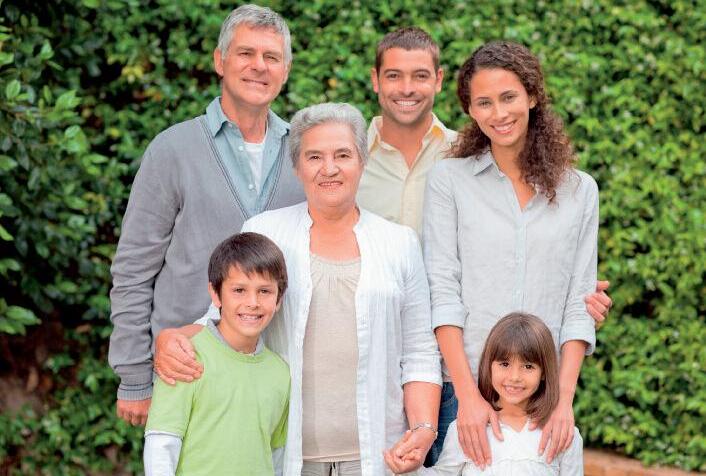

Writing An opinion essay

1

Rubric analysis
Read the rubric, look at the underlined words and answer the questions.
You have had a class discussion about working mothers. Now your teacher has asked you to write an essay expressing your opinion on the following: Should mothers go to work? Write your essay giving reasons to support your opinion (120-160 words)
1 W h a t d o y o u h a v e t o w r i t e ?
2 a ) W h a
b ) W h a
s t y l e ? T i c k ( ✓ )
?
colloquial language and idioms
s h o r t v e r b f o r m s
l o n g e r s e n t e n c e s formal linking words/phrases
Model analysis

Read the model essay. Which paragraph contains:
w r i t e r ’ s f i r s t v i e w p o i n t w i t h
e x a m p l e s / r e a s o n s / r e s u l t s
i n t r o d u c t i o n w i t h t h e w r i t e r ’ s
o p i n i o n
w r i t e r ’ s s e c o n d v i e w p o i n t w i t h
e x a m p l e s / r e a s o n s / r e s u l t s
w r i t e r ’ s c l o s i n g r e m a r k s w i t h a
r e s t a t e m e n t o f h i s / h e r o p i n i o n
o
e
Topic/Supporting sentences
In essays the main body paragraphs should begin with topic sentences
A topic sentence introduces or summarises the main topic of the paragraph and gives the reader an idea of what the paragraph is about
A topic sentence should be followed by supporting sentences which provide examples, results, reasons and justifications to support the topic sentence
The number of mothers who work full time is increasing every year Some people think that women should stay at home with their children, but I strongly feel that being a working mother is beneficial
To begin with, going to work means that mothers can provide more income for the family. For example, they can buy better food and clothing for their children As a result, they can ensure the children have what they need
Secondly, working mothers are excellent role models for children For instance, they demonstrate how to take care of children, the house and pursue a career This sets a good example of how a modern person makes their own choices about their life
On the other hand, working long hours means that mothers spend a lot of time away from home. Therefore, they may miss out on quality time with their children
In conclusion, I believe that although it may be difficult to be a working mother, there are ways to balance work and family Working mothers can help their family financially and become great role models for their children while getting recognition for their work
3

a) Find the topic sentences in the main body paragraphs. Does each introduce a new topic? Which sentences support the topic sentences by giving examples, results, reasons? Which linking words influence the supporting sentences?
b) Replace the topic sentences with other appropriate ones
c) Find examples of formal language.
Linking words/phrases

4

5
Replace the underlined words/phrases in the model with alternatives from the Useful Language box.
Read the paragraphs and choose the correct linking words/phrases.

1) First of all/To sum up, face-to-face communication is more effective than electronic communication. 2) However/For example, when we talk to someone in person, we see their facial expressions and read their body language 3) Since/As a result, we can understand their thoughts and feelings better

4) Alternatively/However, other ways of communicating can be more convenient than letters Electronic communication 5) such as/because emails, tweets and text messages can be sent to anyone at any time. 6) To my mind/In this way, we can get in touch with people almost immediately

Expressing opinion

Find the phrases the writer uses to express his opinion in the model in Ex. 2. Replace them with other appropriate ones from the Useful Language box 6
7

Use expressions from the Useful Language box to expand the prompts to express an opinion.
1 parents/be/best friends with their children
Writing

8
a) Read the rubric and underline the key words
Your teacher has as you to write an essa the following statem It is good to be pa an extended famil
Write your essay, g your opinion with reasons to support point of view (120words)
b) Match the viewpoints (1-3) to the supporting sentences (a-c).
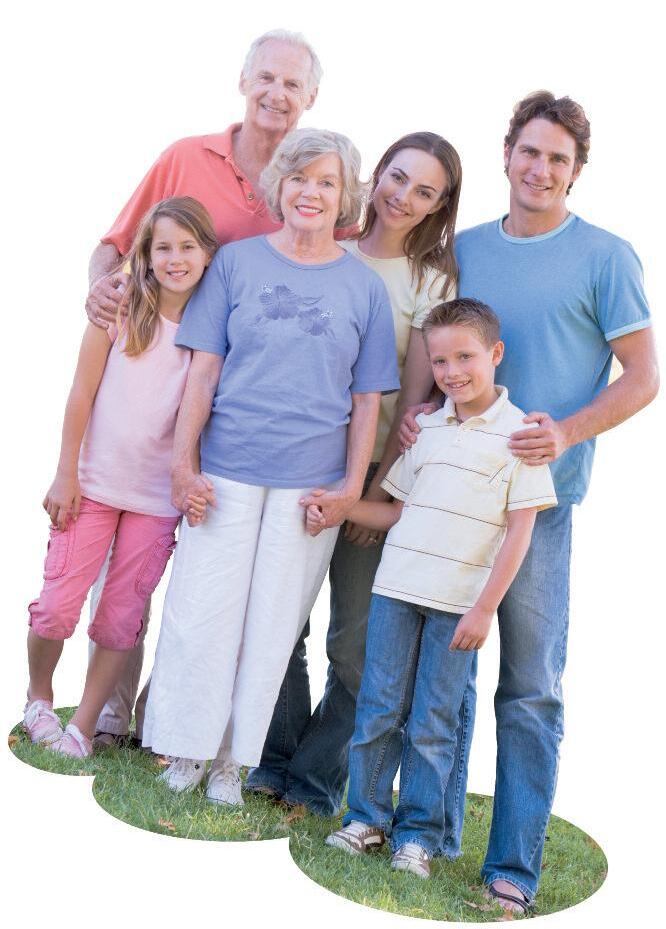
a You can help each other with your problems.
c) Use appropriate words/phrases from the Useful Language box to introduce the viewpoints and join them to their supporting sentences

9
Use the plan and your answers from Ex. 8b as well as your own ideas to write your essay.
Useful Language
Listing & adding points
• Firstly,/First of all ... • To start/begin with, • Secondly, • Moreover,
• In addition/Also, • Furthermore, Introducing examples/reasons/results
• such as/like • For example/For instance, ... • Therefore, ...
• because/as/since ..., As a result, ...
• By doing this,/In this way, Giving opposing viewpoints
• On the other hand, ... • Alternatively, ...
• However, (it can be argued that)
• In contrast, • In spite of Expressing opinion
• I strongly feel/believe that
• In my opinion, • To my mind,
• The way I see it, ... • It seems to me that ...
• I agree/I don’t agree that ...
• As far as I am concerned, Concluding
• In conclusion, • All in all,
• To sum up, • In summary,

Introduction
(Para 1) state topic & give your opinion
Main Body
(Para 2) present first viewpoint with examples/reasons/results
(Para 3) present second viewpoint with examples/reasons/results
(Para 4) present opposing viewpoint with examples/reasons/results
Conclusion
(Para 5) restate your opinion using different words

Checklist
When you finish your piece of writing check it for the following:
• Have you used correct grammar, punctuation & spelling?
• Have you used formal style?
• Have you stated your opinion in the introduction & conclusion?
• Does each main body paragraph start with a topic sentence?
• Have you used appropriate linking words?
• Is your essay the correct length?

Language Knowledge 1
Sentence transformations

Preparing for the task
3

a) Read the complete sentence, then the gapped one. What grammar structure does the second sentence test?
T r a v e l l i n g b y t r a i n i s c h e a p e r t h a n t r a v e l l i n g b y
p l a n e .
t r a v e l l i n g b y p l a n e
A l i t t l e B m o r e C l e s s D m o s t 1
T r a v e l l i n g b y t r a i n c o s t s t h a n
b) Choose the answer that best completes the gapped sentence.

Read the complete sentence, then the gapped one
Identify the grammar structure the second sentence asks for. This will help you complete the gapped sentence so that it means the same as the first one

2

For each question, complete the second sentence so that it means the same as the first. Use no more than three words.
1 E a c h r o o m h a s a b o u t t w e n t y p e o p l e
I n e a c h r o o m
a b o u t t w e n t y p e o p l e
2 T h i s c a m e r a i s n ’ t e x p e n s i v e t o b u y
T h i s c a m e r a d o e s n ’ t c o s t t o b u y
3 P e t e r i s t a l l e r t h a n J a m e s
J a m e s i s n ’ t a s P e t e r
4 E v e r y o n e i n o u r f a m i l y h a s g o t b l u e e y e s
I n o u r f a m i l y , a l l o f u s b l u e e y e s
5 H e l i k e s d o i n g t h i n g s b y h i m s e l f
H e l i k e s d o i n g t h i n g s o w n
6 She likes travelling, and her friend likes it, too
S h e l i k e s t r a v e l l i n g a n d s o h e r f r i e n d
7 She has visited more places than her cousin
H e r c o u s i n h a s n ’ t v i s i t e d a s s h e h a s
8 T h e y l i k e b e r r i e s b e t t e r t h a n b a n a n a s
T h e y b e r r i e s t o b a n a n a s
9 T h e v i l l a g e i s n e a r t h e r i v e r .
T h e v i l l a g e i s t o t h e r i v e r
1 0 P a u l h a s n e v e r s e e n a b a b o o n b e f o r e .
T h i s i s t h e
P a u l h a s s e e n a b a b o o n
Here are some sentences about John. For each question, complete the second sentence so that it means the same as the first. Use no more than three words.
1 My friend John has got an expensive camera M y ................................ i s v e r y e x p e n s i v e .
2 E v e r y o n e i n h i s f a m i l y l i k e s h i s p h o t o s
I n h i s f a m i l y , a l l o f t h e m
h i s p h o t o s .
3 His studio isn’t far from h i s h o u s e
H i s h o u s e i s t o h i s s t u d i o
4 T h e r e a r e t w o w i n d o w s i n t h e r o o m
T h e r o o m t w o w i n d o w s
5 H e m a k e s m o r e m o n e y t h a n m e
I m a k e m o n e y t h a n h i m

4
5

Here are some sentences about Sandra. For each question, complete the second sentence so that it means the same as the first Use no more than three words
1 S a n d r a l i k e s w o r k i n g w i t h o t h e r s m o r e t h a n
o n h e r o w n
S a n d r a
w o r k i n g w i t h o t h e r s t o w o r k i n g o n h e r o w n
2 S h e i s t h e m o s t p o l i t e p e r s o n i n t h e o f f i c e
N o o n e i n t h e o f f i c e i s a s s h e i s
3 S a n d r a h a s n ’ t g o t a n y b r o t h e r s o r s i s t e r s i n
h e r f a m i l y
I n h e r f a m i l y
a n y b r o t h e r s o r s i s t e r s
4 T e n n i s i s h e r f a v o u r i t e s p o r t
S h e l i k e s t e n n i s a n y o t h e r s p o r t
5 S a n d r a ’ s f a v o u r i t e p e r s o n i s h e r a u n t
S a n d r a l i k e s h e r a u n t a n y o t h e r p e r s o n
Word formation
Complete each sentence with a word derived from the words in bold. Check in your dictionary.
1 Y o u c a n a l w a y s d e p e n d o n S u e . S h e ’ s ( R E L Y )
2 H e ’ s a l w a y s t e l l i n g o t h e r s w h a t t o d o ; h e ’ s . . . . . . . . . . . . . . . . . . . . . . . . . . . . ( B O S S )
3 Y o u n g c h i l d r e n t e n d t o b e ( N O I S E )
4 S h e n e v e r r e m e m b e r s w h e r e h e r t h i n g s a r e ; s h e ’ s s o ( F O R G E T )
5 He’s got short hair ( W A V E )
6 He can get easily ( B O R E )
6

Grammar
Choose the item that best completes each sentence.
1 Every week, the men leave the village ............ for food.
A have hunted C hunt B to hunt D hunting
2 This land is wild; no farmer has ever ............ crops on it.
A growing B grow C grows D grown
3 The photographer spent a week ............ the forest.
A to wander C wandering B to wandering D wander
4 It’s only the first time I ............ him behave like this.
A sees C see B have seen D am seeing
5 They ............ wood for the fire since morning.
A have gathered C have been gathering B gather D are gathering
6 The train ............ for the airport at six o’clock in the morning.
A has left C has been leaving B is leaving D leaves
7 They ............ to the meeting tomorrow.
A have been coming C come B have come D are coming
8 John is ............ tall and slim.
A much C quite B far D enough
9 I have ............ Canada and Mexico, but this is my first time in the United States.
A gone in B gone to C been to D been in
10 She ............ on that project for the last two days.
A has working C is working B has been working D works
11 What to wear to dinner is ............ of my worries. A little B less C the least D lesser
12 These things take time; you must learn to be ............ patient.
A more B most C much D many
13 Many tribes are better ............ things than so-called civilized people.
A in sharing C to have shared B that are sharing D at sharing

1 Language Knowledge
Vocabulary

Choose the item that best completes each sentence.
1 To run a mile in under four minutes, you have to be very ............ indeed.
A fit B lean C strong D right
2 Polish is his native ............ .
A mouth B speech C language D talk
3 He’s been losing weight this year. He’s in much better ............ .
A form B size C dimension D shape
4 He’s afraid of ............ his friends when he moves to his new house.
A forgetting C missing
B leaving D losing
5 The man the police are looking for is in his ............ thirties.
A recent B late C last D past
6 Doing the housework and looking after four children leaves her with very little ............ time.
A empty B loose C open D free
7 Janet feels ............ about going to college.
A nervous C disappointed
B angry D bored
8 Don’t let your ............ build up. Talk to someone about them.
A trouble B worries C pains D fears
9 He is very calm. He shows very little ............, even when people are rude to him.
A reaction B answer C response D reply
10 Looking up at the night sky, I often ............ if there’s any intelligent life out there.
A wonder B worry C question D think
11 He likes to ............ his free time exercising, reading, or playing the piano.
A pass B waste C spend D fill
12 Being an orphan, Anna has a ............ relationship with her grandmother.
A close B near C dear D next
13 We shouldn’t hide what we really think. We must ............ ourselves freely.
A state C express
B communicate D show
14 They aren’t twins, but they ............ very similar!
A look B see C grow D view
15 My brother and I always ............ on well.
A come B hold C keep D get

Language Focus 1

Complete the sentences with the words in the lists. Check in the Word List at the back of the book.
• t h i n • s l e n d e r • s l i m
1 T h a n k s t o a g o o d d i e t a n d l o t s o f e x e r c i s e ,
t h l e
m u s c u l a r
2 P e o p l e w h o c o m e f r o m c o l d l a n d s a r e
n o r m a l l y s h o r t a n d s t o c k y , w h i l e p e o p l e
f r o m d e s e r t s a r e t a l l a n d
3 F e m a
l e g s a n d n e c k s
• w e l l - b u i l t • p l u m p • o v e r w e i g h
4 G e o r g i a i s s l i g h t l y . . . . . . . . . . . . . . . . . . . . . . . . . . . s o s h e
i s g o i n g o n a d i e t .
5 She’s got arms so she avoids wearing sleeveless tops.
6 John is tall and

2
Match the opposites.
b e a u t i f u l
c a l m
b r a v e
c a r e f u l
c h e e r f u l
n o i s y
p o l i t e
f e e b l e
m o d e s

3
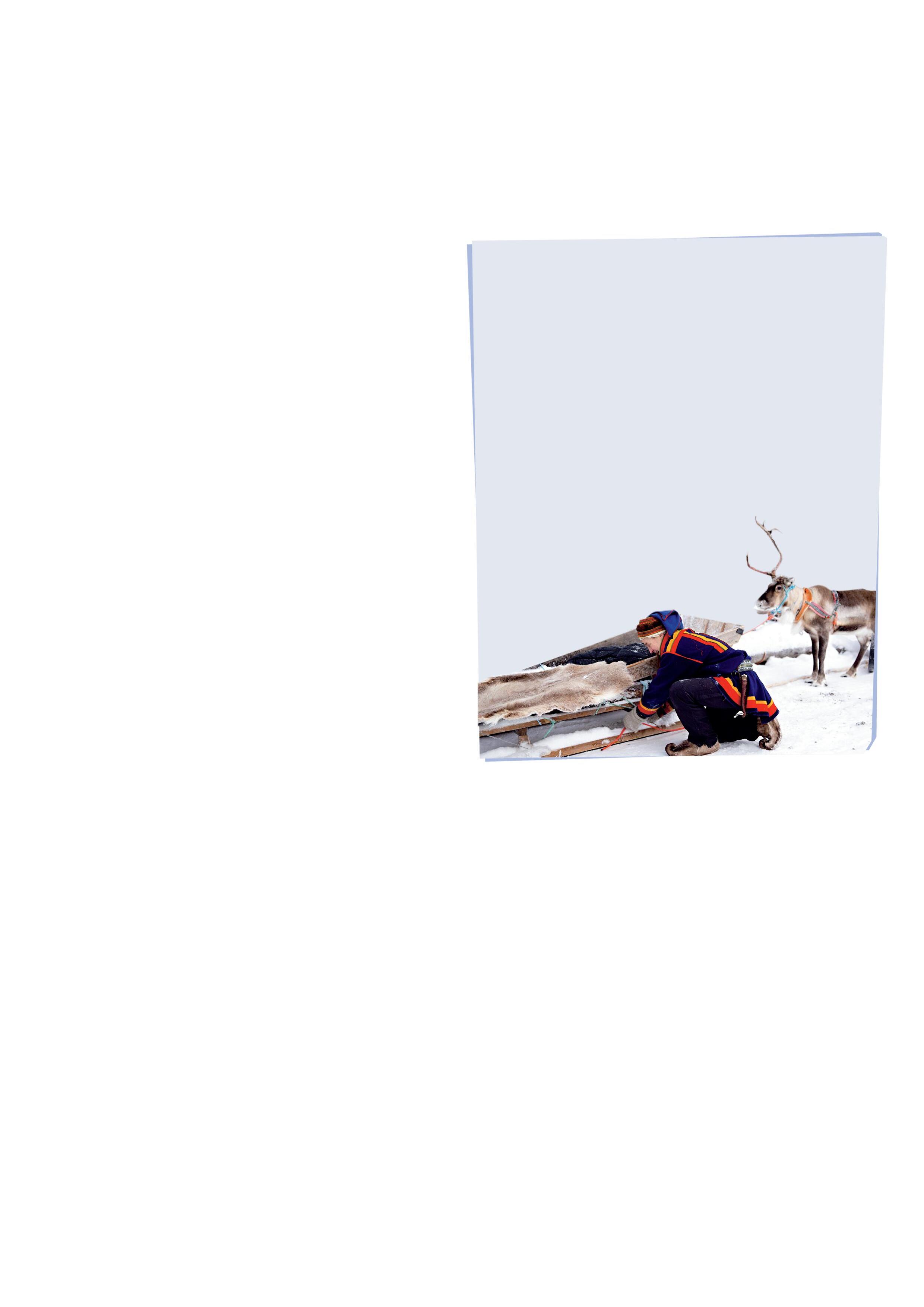
e a r r o g a n t
f d u l l
g c o w a r d l y
h a n x i o u s
i q u i e t
j u g l y
For each question, complete the second sentence so that it means the same as the first. Use no more than three words.
1 T h i s b r a c e l e t i s c h e a p e r t h a n t h a t o n e
T h i s b r a c e l e t c o s t s t h a n t h a t o n e
2 T h e r e a r e f i v e f l o o r s i n t h i s b u i l d i n g
T h i s b u i l d i n g
f i v e f l o o r s
3 M a r k h a s n e v e r h a d h i s o w n h o u s e b e f o r e .
T h i s i s t h e ..................................................
t h a t M a r k h a s h a d h i s o w n h o u s e
4 M a r y u s e s h e r c a m e r a f o r t a k i n g p h o t o s o f
h e r f r i e n d s
M a r y u s e s h e r c a m e r a
t a k e p h o t o s o f h e r f r i e n d s
5 A n n ’ s n e c k l a c e i s v e r y s i m i l a r t o H e l e n ’ s
A n n ’ s n e c k l a c e i s a l m o s t t h e s a m e ............
4

Choose the correct words. Then put the words in brackets into the plural form. Which nouns are irregular?
The Sami of Lapland
The Sami 1) people/persons of northern Finland and Norway 2) manage/succeed to survive in 3) some/any of the coldest environments in the 4) planet/world. 5) ...................... (Temperature) can be as 6) low/small as -30°C! They move many 7) ...................... (kilometre) every year 8) across/above the frozen land, to find food for their reindeer 9) ...................... (herd). 10) Living/Staying in a frozen land they rely on reindeer for food, clothing and houses. They 11) make/do their own tents and clothes from reindeer skin and use reindeers or dogs to 12) pull/push their sleds While the 13) (man) are out 14) taking/looking care of the reindeer and keeping 15) (wolf) away, the 16) (woman) are busy doing everything else They chop wood, cook food, build their tents and make clothes Sami life is only for 17) them/those who are willing to work hard

Grammar in Focus
Complete the gaps with the correct words. Then put the verbs in brackets into the correct tense.
The men of the Mosuo tribe in China may have the physical strength, but it’s the Mosuo women 1 ) have all the power That’s because the Mosuo is one 2 ) the last societies in which everything is run 3 ) the women While the men farm the land, the women, in their role 4 ) head of the house, make 5 ) of the decisions for the extended family The children take 6 ) mother’s surname and the eldest female of the house 7 ) ( s u p e r v i s e ) the money and everyone’s jobs. After years of 8 ) ...................... ( l i v e ) in a remote village 9 ) away from the modern world, though, the Mosuo 1 0 ) ........................................ ( e x p e r i e n c e ) massive changes Their lifestyle 1 1 ) ( a t t r a c t ) a lot of attention recently and they 1 2 ) ( b e c o m e ) a popular tourist attraction
1 Progress Check
Reading

Read the text and choose the correct answer A, B, C or D for questions 1-5
1 W h a t i s t h e w r i t e r d o i n g i n t h i s t e x t ?
A d e s c r i b i n g a t r i b e ’ s h a b i t a t
B e x p l a i n i n g a t r i b e ’ s t r a d i t i o n s
C g i v i n g i n f o r m a t i o n a b o u t a t r i b e
D d e t a i l i n g w h y t h e I n u i t h a v e s u r v i v e d
2 W h a t d o w e l e a r n a b o u t t h e I n u i t f r o m
t h e t e x t ?
A t h e i r l i f e s t y l e a n d c u s t o m s
B h o w t h e y s p e n d t h e i r f r e e t i m e
C h o w t h e y b u i l d t h e i r h o u s e s
D w h a t m a k e s t h e m s p e c i a l
3 H o w d o e s t h e w r i t e r d e s c r i b e t h e I n u i t ?
A T h e y a r e g o o d f i g h t e r s
B T h e y a r e p e a c e f u l .
C T h e y a r e a r t i s t i c
D T h e y o f t e n a r g u e
4 W h a t i s N O T t r u e a b o u t t h e I n u i t ?
A T h e y a r e h a p p y p e o p l e
B T h e y r e s p e c t t h e i r t r a d i t i o n s
C T h e y l i v e t o g e t h e r p e a c e f u l l y
D T h e y c a n n o t s u r v i v e i n t h e c o l d
5 W h i c h t i t l e b e s t s u m m a r i s e s t h e t e x t ?

Hunting for seals and polar bears

2

The history of a people
Living in the wild B C D
The people of the North


( 5 x 4 = 2 0 )
Listening
Listen to a discussion about what makes a good friend For questions 1-5 decide if the sentences are T (true) or F (false).
1 D r P o r r i t s a y s f r i e n d s h i p s a r e
s t r o n g e s t a t s c h o o l
2 J a n e t h i n k s t h a t g o o d f r i e n d s l i s t e n w i t h o u t c r i t i c i s i n g
3 D r P o r r i t t h i n k s d i s a g r e e i n g
c a n b e u s e f u l i n a f r i
4 A b
a s e n s e o f h u m o u r n e v e r
a r g u e
5 D r P o r r i t p r e f e r s f r i e n d s t h a t
d o n o t l a u g h v e r y o f t e n
( 5 x 2 = 1 0 )

Do you think you could live in a world with cold weather, dangerous animals and little daylight? Well, the Inuit have done so for thousands of years. Let’s take a look at how they live their lives.
W h e r e d o t h e y l i v e ?
The Inuit live in the frozen north of Canada, Russia and Alaska. In winter, temperatures can be as low as -50°C so it’s very difficult for plants to grow Even in summer it rarely gets above zero The Inuit people have been living in extreme conditions for centuries, spending their entire lives on the snow that blankets the Arctic
?
The Inuit are short and well-built with almond-shaped eyes and straight black hair They wear large, thick coats with big, fur-lined hoods called ‘parkas’ to keep warm during the cold winters They also wear big boots and furry gloves to protect their hands and feet
The Inuit are a cheerful and friendly people who believe in sharing everything they have with others. Because they live in small groups they value harmony and frown on arguments and fighting.
H o w d o t h e y l i v e ?
Inuit men are hunters and they spend their days out on the ice looking for whales, seals and even polar bears to catch and bring back home In winter they cut holes in the ice and go ice fishing
On winter hunting trips they live in temporary, dome-shaped houses called ‘igloos’ made from blocks of snow They use dogsleds and snowmobiles to travel the frozen Arctic Women can also go hunting, but most choose to stay at home and sew, cook, build tents and bring up the children In order to make the most of the sunlight and warmth the Inuit go to bed very early and get up at 5 am to start their working day.
W h a t a r e t h e i r t r a d i t i o n s ?
The Inuits keep their history alive through a tradition of storytelling. The elders teach their children about their history with mythical stories and legends A popular tradition is the ‘drum dance’ held at births, weddings and funerals The whole community gets together and performs songs and dances to the beat of a massive drum
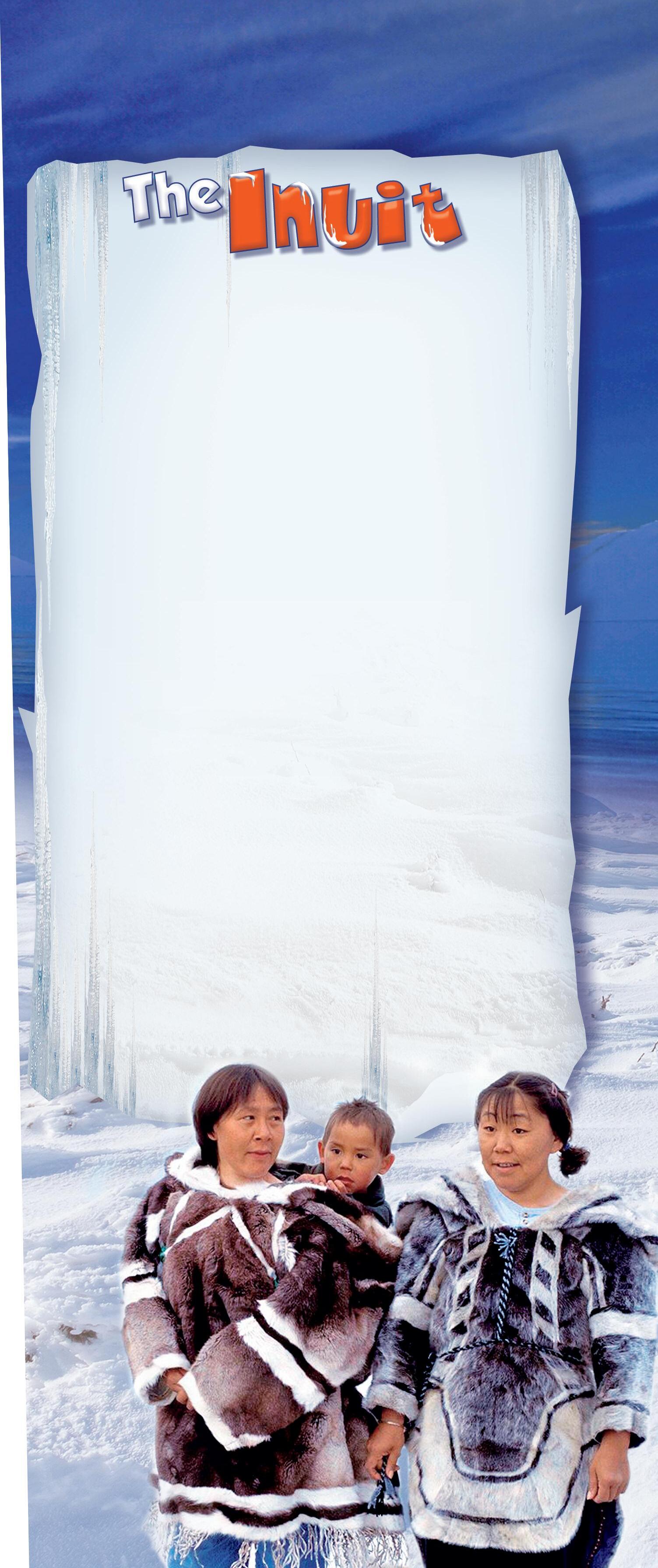

Speaking

3
Choose the correct response.
1 A : D o n ’ t y o u a g r e e ?
B : a S o m e t i m e s I h a v e
b Y e s , t h a t ’ s a g o o d p o i n t
2 A : S h e n e v e r p u t s h e r t h i n g s a w a y
B : a How annoying! b I strongly believe that!
3 A : W h a t ’ s y o u r o p i n i o n ?
B : a I f y o u t h i n k s o b I c o u l d n ’ t a g r e e m o r e
4 A : W h a t d o y o u t h i n k ?
B : a A b o u t a l l s o r t s o f t h i n g s
b T h a t ’ s n o t r i g h t
Vocabulary

4
( 4 x 2 = 8 )
Fill in: wrinkles, early, reliable, sensitive, curly, track, grumpy, elder, bossy, impatient.
1 D o n ’ t c o u n t o n J a c k ; h e i s n ’ t
2 S u e ’ s g o t s h o r t h a i r
3 O l d p e o p l e o f t e n h a v e
o n t h e i r f a c e s
4 Harry gets upset very easily; he’s
5 M y s i s t e r h a s g o t b l u e e y e s
6 H e l i k e s t e l l i n g p e o p l e w h a t t o d o ; h e ’ s
7 J e n n y ’ s r e a l l y . . . . . . . . . . . . .
h a s n ’ t s l e p t w e l l .
. . w h e n s h e
. . . . . . . .
8 T o m ’ s i n h i s t h i r t i e s
9 J a c k ’ s s o ; h e c a n ’ t e v e n
w a i t f o r a b u s !
1 0 J a n e c a n ’ t k e e p o f t i m e
Grammar

Choose the correct item.
1 Anthony w o r k s / i s w o r k i n g in a local café every weekend
2 T a m m y h a s y e t / a l r e a d y l e f t
3 T h e f a s h i o n s h o w i s s t a r t i n g / s t a r t s a t
8 o ’ c l o c k t o n i g h t
4 H e ’ s m o r e p a t i e n t t h a n / f r o m h i s b r o t h e r
5 Is Sarah coming/Does Sarah come tonight?
6 J o h n a p p e a r s / i s a p p e a r i n g t o b e a r e a l l y k i n d p e r s o n
7 W h a t ’ s w r o n g w i t h B r i a n ? H e i s l o o k i n g /
l o o k s u p s e t !
8 He’s the funnier/funniest person in my family
9 Mark is thinking/thinks of buying a new suit
1 0 H e h a s w o r k e d / h a s b e e n w o r k i n g a l l m o r n i n g a n d f e e l s
6

For each question, complete the second sentence so that it means the same as the first. Use no more than three words.
1 T e d i s m u c h s h o r t e r t h a n J o h n
J o h n i s n ’ t a s T e d
2 A n n ’ s f a v o u r i t e p o s s e s s i o n i s h e r c a m e r a .
A n n l i k e s h e r c a m e r a a n y o f
h e r p o s s e s s i o n s
3 No one else in our class is as noisy as John.
J o h n i s
i n o u r c l a s s
4 G e o r g i a ’ s s c a r f i s v e r y s i m i l a r t o S u e ’ s . G e o r g i a ’ s s c a r f i s a l m o s t t h e s a m e S u e ’ s
5 H e r h o u s e i s c l o s e t o w o r k . H e r h o u s e i s n ’ t t o o w o r k

7

8
Choose the correct item
( 5 x 2 = 1 0 )
1 J a n e i s a b i t j e a l o u s w i t h / o f J o s i e ’ s c l o t h e s !
2 S a m ’ s c a r h a s b r o k e n d o w n / u p !
3 I get on well with my sister because we have a lot w i t h / i n common
4 Sadly, some married couples break up/down
5 Harry is very patient w i t h / o f his little brother, Alex
Writing
( 5 x 1 = 5 )
Read the rubric, then write your essay
Your teacher has asked you to write an essay giving your opinion on the following statement: Good friends are important. Write your essay, giving examples/reasons for your viewpoints (120-160 words)
h e c k y o u r p r o g r e s s ( 1 7 m a r k s ) ( T o t a l = 1 0 0 )

• describe people’s appearance and character
• express opinion, agreement & disagreement politely
• compare people
• write a personal letter
• write an opinion essay

✓
✓✓



On Screen B1+ is a modular course at CEF Level B1+ The course combines active lear ning with a variety of lively topics presented in eight themed modules.
FOR THE STUDENT



